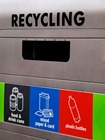Finally Getting the Message: Airline & Airport Recycling
by Christine Negroni, NEW YORK TIMES, February 22, 2010
 The aviation industry is often criticized for contributing to global warming through airplane exhaust. But waste of a different kind also has the potential to create environmental problems. Even before they board, air travelers throw away trash of all sorts — including paper, plastic and food waste — and airports and airlines recycle only a small portion of it.
The aviation industry is often criticized for contributing to global warming through airplane exhaust. But waste of a different kind also has the potential to create environmental problems. Even before they board, air travelers throw away trash of all sorts — including paper, plastic and food waste — and airports and airlines recycle only a small portion of it.
An estimated 7.5 million pounds of trash is generated every day. While the Natural Resources Defense Council, an environmental advocacy group, says that 75 percent of that trash is recyclable, it has found that only 20 percent reaches a recycling center.
“It does not make sense to acquire oil from the Middle East or the north slope of Alaska and turn it into a plastic bottle, use it once and throw it away,” said Allen Hershkowitz, a scientist at the council.
The council’s figures are from 2006, but are the most recent. The lack of current data was one concern of the Air Transport Association and the Airports Council International. They persuaded the Transportation Research Board, an adviser to the federal government, last November to determine what prevented airports from embracing recycling since travelers seemed to want it.
Recycling procedures vary by airline and airport. Environmental programs involve many entities: airports, municipalities, private waste companies and federal security agencies. As a result, each of the nation’s 552 commercial airports has its own way of handling waste.
“The issue is very local,” said Nancy Young, the transport association’s vice president of environmental affairs. Continental Airlines has been recycling oil, antifreeze and other aircraft maintenance products for two or three years. Recently it began onboard collection of bottles, aluminum cans and cardboard boxes. Leah Raney, managing director of global environmental affairs for Continental, said it was recycling these items through kitchens it owns at hub airports. [Read rest of story]


